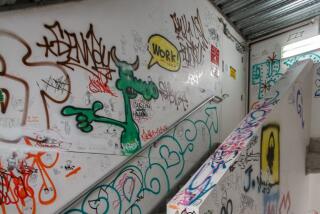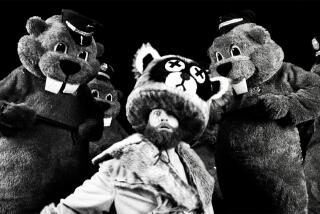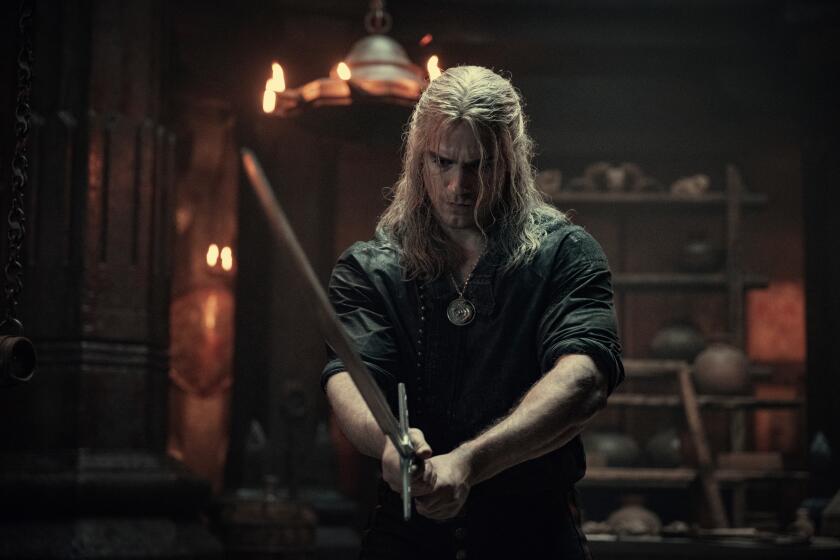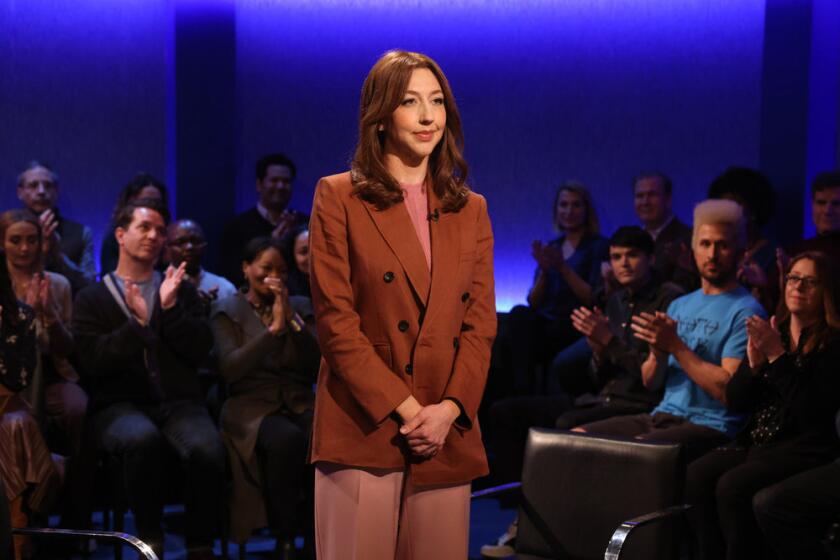Critic’s Notebook: A fresh visit to ‘Pee-wee’s Playhouse’
Paul Reubens’ “Pee-wee’s Playhouse,” which ran on CBS on Saturday mornings from 1986 to 1990 and has been repeated on various networks and home video platforms in the years since, is back again. “And better than ever,” I cannot help but add, because it is, in plain fact, true.
Released last week by Shout Factory, the Blu-ray set “Pee-wee’s Playhouse: The Complete Series” presents the show literally as you’ve never seen it before: Although it was shot on 16mm film, the series was edited and assembled on tape, losing clarity at each step. The new set, not so much restored as rebuilt from scratch, from the original film elements — which Reubens fortunately owns and has kept — reveals “Pee-wee’s Playhouse” for what it is: a great collaborative work of popular art and an astonishingly beautiful one to boot.
See more of Entertainment’s top stories on Facebook >>
“Not to be too corny, but almost every minute of it is revelatory to me,” Reubens told me recently. Having worked on the release “probably five days a week for the last year and a half, I’ve seen every frame of it, over and over and over. I see so much detail that I either never knew was there and forgot or have been reminded about.”
Not to be too corny, but almost every minute of it is revelatory to me.
— Paul Reubens
“Pee-wee’s Playhouse” was a high-res show for what was in its time still a low-res medium. As now seen, it has an uncorrupted celestial freshness; for anyone familiar with the original, it may seem less that the dust has been cleared from the “Playhouse” than that it has been blown from one’s own eyes.
It is as if the world has caught up now. The film transfer makes the show feel fantastically present, both in time and space. The set itself, with its wealth of detail and mad yet sophisticated color palette, becomes a kind of character. (You might even say it glows.) And that the handmade quality of the puppets and the animation is more readily apparent — the strings and the joints on the marionettes were always part of the point, this being Puppetland — makes them seem somehow more alive. Pee-wee is surrounded by sentience.
That it is something more than a kids’ series — often called a cult show for its up-from-the-underground aesthetic, though this misses its enormous popularity — is underscored by the set’s documentary extras. Perhaps to avoid any cognitive dissonance, Reubens remains absent, much as he kept himself invisible during Pee-wee’s heyday, but nearly all the other key personnel are featured, including production designer Gary Panter, designer and puppeteer Wayne White, composer Mark Mothersbaugh and actors Laurence Fishburne, S. Epatha Merkerson and Lynne Marie Stewart. The people who made “Playhouse” were not for the most part TV professionals but rather a community of artists working in the service of a singular vision.
“I went out of my way to figure out ways I could make it a great experience,” Reubens recalled, “and I think the material and the people we chose and the spirit of it all and the energy made it one of those things that come along once in a while where everyone feels, ‘Wow, I’m doing something really great. I love coming to work.’ Not to be pretentious in any way, I swear to you, but we felt we were doing something important. I don’t mean like ending world hunger, but touching young minds, being able to shape somebody’s path in some way by encouraging creativity and nonconformity. I felt it was my calling, kind of, and I took it extremely, maybe even to some people, too seriously.”
Reubens himself came out of the California Institute of the Arts, where he’d transferred from Boston University. “BU was very traditional and conservative, and I wanted to be avant garde and way out, and I was very influenced by conceptual art and performance art. My subsequent immersion in it at CalArts absolutely informed Pee-wee Herman. I always viewed Pee-wee Herman a little bit as performance art and conceptual art — the concept was that nobody knew that that’s what it was.”
See the most-read stories in Entertainment this hour >>
“Playhouse” was both a pastiche of a certain sort of 20th-century children’s show — the puppet-filled house of friends into which visitors come calling — and the thing itself. Not a parody but a celebration, it gives no sense of superiority, of mocking its sources, but rather filters them through a contemporary sensibility into something distinctly of its time and yet also timeless.
Though produced in its first year out of New York, the series has always seemed to me to express a local sensibility, the concentrated embodiment of Melrose Avenue in the super-colorful, busy, visually asymmetrical 1980s, something by and for a post-punk, pre-grunge generation of young adults in no rush to give up their toys. (When the show moved production to Los Angeles in its second season and needed to dress the set in a hurry, Panter reveals in a Blu-ray interview, they went down to the alt-toy-store Wacko!, then on Melrose, and stocked up.)
Reubens has often said that the original “Pee-wee Herman Show,” staged first at the Groundlings theater and then at the Roxy — Pee-wee was a local celebrity before he went worldwide — was inspired by his unsuccessful audition for “Saturday Night Live.” In his “frustration, panic and anger” at not getting hired, he conceived the show on the plane ride back to L.A.
“I borrowed $5,000 from my parents and produced it on that, and that included the Groundlings charging me to rent the space for rehearsal and performance. Then going to produce the first season of ‘Pee-wee’s Playhouse,’ I had the biggest budget anyone had ever had for a network children’s program. I think every penny went onto the screen; even though we had a lot of money, we had a very ambitious project and hundreds and hundreds of people working.”
What did he imagine would have become of Pee-wee had he gotten “SNL”?
“I think I would have had a more ... rounded career, maybe? I probably had 10 other characters at that time; I went to New York with a huge bag full of props and costumes. I would have gotten to do more of them, rather than just like, ‘Oh, he’s Pee-wee Herman.’ But I went out of my way to make people feel like there was no Paul Reubens and that Pee-wee Herman was a real person, because I thought it worked better.
“Phil Hartman was always frustrated I wasn’t doing more characters, and I said, ‘I can’t explain it, Phil. I just feel like this is my path; I’m going to be able to be more successful if people believe this one person’s a real thing.’”
While Reubens, 62, has had a varied career as a character actor and voice artist — he has a recurring role on NBC’s “The Blacklist” — Pee-wee has remained a continuing presence in his life. In 2010, Reubens revived “The Pee-wee Herman Show” for successful stage runs in Los Angeles and New York; the latter was recorded by HBO and aired in 2011 as “The Pee-wee Herman Show on Broadway,” two decades after the cable network aired a special shot at the Roxy show. A long-planned Judd Apatow-produced Pee-wee film is still in the works; a big announcement on that front, Reubens said, is coming soon.
“When I was at CalArts” he recalled, “I always felt, ‘Don’t ever censor anything you’re interested in.’ I had this feeling that all would be revealed at some point — that everything I was doing was going to snowball into something. When Pee-wee Herman came out one day, I was ready to recognize, ‘This is it.’”
Follow me on Twitter: @LATimesTVLloyd
More to Read
The complete guide to home viewing
Get Screen Gab for everything about the TV shows and streaming movies everyone’s talking about.
You may occasionally receive promotional content from the Los Angeles Times.







